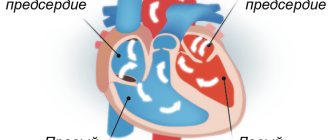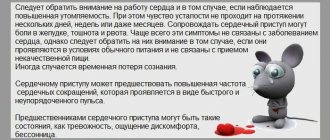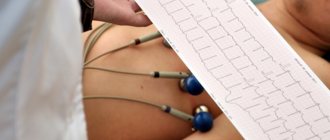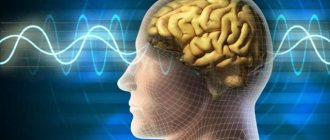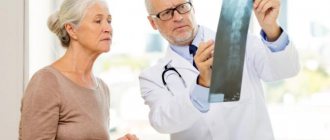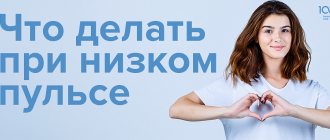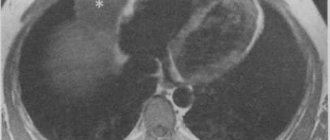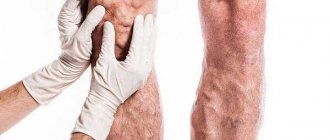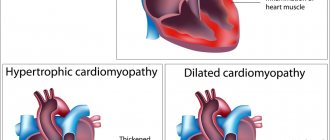Many patients come to the doctor with an “accurate” diagnosis, made independently. Without examination, they are sure that their heart hurts, and they are very surprised and even upset that the doctor does not detect signs of heart disease. On the one hand, this is even good, because people know about the danger and are trying to find out what to do if their heart hurts seriously.
On the other hand, such fear can lead to cardioneurosis, a brain disease in which pain in the heart is also felt.
Where is the heart
Not every person can show where his heart is located. Doctors use the phrase “pain in the heart area”, knowing in advance where this place is.
Typical heart pain occurs behind the sternum, in the upper part. Less common to the left of the sternum. In this zone there is a projection of the “main motor”.
But the costal arches with intercostal nerves are also located here, and the roots from the thoracic region are located behind the spine.
The pain may be associated with the pleura, which envelops the left lung.
Stomach ulcers, gastritis, and inflammation of the pancreas can cause constant pain in this area. They provoke pain in the epigastrium and lower part of the sternum.
You can massage the painful area yourself
Experienced excitement and stress leave behind a painful reaction. Therefore, do not rush to make a diagnosis. Tell your doctor in detail about your feelings, associated causes and connections with external influences. This will help you take the necessary measures and promptly recognize the true pathology of the heart.
How does “non-cardiac” pain feel to the left of the sternum?
Let's look at the main causes that mimic heart pain.
Intercostal neuralgia, osteochondrosis
With intercostal neuralgia and osteochondrosis of the thoracic spine, the appearance of pain is more often associated with hypothermia, sudden lifting of weight, prolonged uncomfortable body position, bruise of the chest (rib fracture). They can be very intense (to the point of tears). They intensify with a deep breath, with the slightest movement of the body. During palpation, the most painful place is detected along the rib or near the spine.
Pleural involvement
The pleura is damaged by chest trauma, is involved in the inflammatory process against the background of lobar pneumonia, and reacts with effusion in allergic manifestations.
Compare the left and right sides: on the left, pleural plaque covers the lower ribs
The most severe damage is contamination of the pleura with malignant metastases from the tumor. The pain is constant, quite severe, and is associated with coughing and breathing.
Neurosis
Cardioneurosis is characterized by other signs of unrest: increased sweating, agitation, hand tremors, insomnia. The pain to the left of the sternum is dull, constant or stabbing in nature and is not relieved by heart medications.
They are more often observed in emotional women or in strong people who strive to maintain apparent calm.
Diseases of the stomach and pancreas
Diseases of the digestive system, as a rule, have, in addition to pain, other manifestations: heartburn, nausea, bloating, vomiting, and broken stools. Pancreatitis is characterized by a girdling direction of pain.
There is always a connection with the timing of meals and non-compliance with the diet.
Causes of true heart pain
True heart pain occurs due to malnutrition of a certain area of the heart muscle. This is possible with:
- spasm of the coronary vessels, their impaired tone, incorrect reaction (hypertension, vegetative-vascular dystonia);
- inflammation of the myocardium (myocarditis);
- the occurrence of ischemia from a pronounced atherosclerotic process or thrombosis;
- myocardial dystrophy and cardiosclerosis;
- heart defects;
- chronic heart failure.
Ischemic pain is most pronounced in acute myocardial infarction. They are intense, retrosternal, last up to a day or more, and are accompanied by pallor and a drop in blood pressure.
Angina pectoris often depends on physical or emotional stress. Substernal pressing pain radiates to the left, to the shoulder, shoulder blade, jaw.
Other heart diseases cause long-term, intermittent, dull or stabbing pain with varying degrees of radiation. Accompanied by arrhythmia, increased blood pressure, body temperature, dizziness, and general weakness.
Women often complain with complaints during menopausal changes in the body. Here the pain is caused by a lack of sex hormones. They are provoked by anxiety and poor nutrition. Accompanied by many vivid emotions: fear of death, suffocation (without increased breathing), darkening of the eyes, interruptions in rhythm, sweating. In men, menopause also matters, but it usually occurs later and coincides with the development of atherosclerosis and true ischemia.
Cardiac glycosides
The safest group of drugs that use digitalis extract as the main active ingredient. The cost of drugs in this group is not high.
Celanide
The drug improves the quality of heart contractions and reduces blood pressure. The maximum therapeutic effect is achieved after 2 hours, which is why tablets are not used for emergency pain relief. The main contraindications are the acute phase of a heart attack, myocarditis, and shock.
Attention! Start taking the drug with minimal dosages, increasing them if necessary. The initial dose is 1 tablet 3 times a day. The drug may also be prescribed to relieve cardiac shortness of breath.
- Drug treatment of knee arthritis: tablets, ointments, injections
Digoxin
The drug increases the content of potassium ions in cells and improves heart function. The medicine is used in complex therapy of heart failure, not only to relieve pain, but also to improve the functioning of the organ. The drug is contraindicated in the following cases:
- isolated mitral stenosis,
- intoxication of the body of glycosidic nature,
- persistently low heart rate.
Due to the fact that when using the drug there is a danger of developing serious life-threatening abnormalities, treatment with it is carried out only in a hospital setting under strict medical supervision.
What to do if there is pain
Patients themselves know how to help themselves with pain in the heart due to a known disease; doctors teach them this. If you have pain, you should not take unfamiliar medications. Perhaps they are contraindicated for a particular person.
- If pain is accompanied by high blood pressure in a hypertensive patient, you should take quick-acting medications (dissolve under the tongue).
- For angina pectoris, sprays such as Isoketa are prescribed. Patients should carry them in their pocket with them. Nitroglycerin acts on the affected vessels, but is not well tolerated by everyone. Severe headaches are possible.
- At home, mustard plaster placed on the heart area and massage on pain points have a distracting effect.
Massage along the spine helps with osteochondrosis with pain
Peripheral vasodilators
Heart tablets from this category act on the smooth muscles of small vessels, leading to their expansion and improvement of function, due to which blood circulation and blood supply to the heart muscle are restored.
Such drugs are taken under the tongue, which allows them to achieve effect within 2 minutes due to direct penetration into the bloodstream system. According to their effects, such drugs have their own classification, which is related to which vessels the medicine dilates:
- venules - nitrites, nitrates, molsidimines,
- arterioles – hydralosine, diazoxide, minoxidil, potassium channel activators,
- arterioles and venules - isosorbide dinirate, sodium nitroprusside.
The drugs are used to eliminate pain in the heart, and in cases where the patient has difficulty breathing. The main advantage of the drugs is their speed of action.
Nitroglycerine
The product belongs to the category of nitrates. Maximum effectiveness is observed when eliminating an attack of angina pectoris, as well as during a heart attack, when in the chest, in addition to pain, there is also strong pressure that impairs breathing.
Contraindications for taking nitroglycerin are extensive:
- pregnancy,
- breast-feeding,
- childhood,
- increased intracranial pressure,
- recent traumatic brain injuries,
- stenosis (mitral),
- persistent low blood pressure,
- cardiac tamponade,
- consumption of Viagra less than 24 hours ago.
After taking the medicine, if there is no improvement after 5 minutes, you can take a second dose. If 2 tablets do not help relieve the attack, you must urgently call an ambulance. The effect of the drug lasts for 45 minutes.
In case of a particularly severe attack, it is permissible to take the drug under the tongue in combination with validol. In rare cases, the body has a negative response to the drug, which is expressed as follows:
- headache,
- rapid drop in blood pressure,
- dizziness.
Nitroglycerin is considered an emergency first aid drug for a heart attack.
- Claritin for allergies
Cardiket
The effect of the medicine begins 15 minutes after administration and lasts for several hours. If an attack of angina occurs, the drug does not give the desired effect. It is prescribed to relieve pressing pain. Contraindications against this drug are as follows:
- collapse,
- shock,
- persistent decrease in blood pressure,
- high intraocular pressure,
- high intracranial pressure,
- recent head injuries, both open and closed.
The drug is prescribed with a minimum dosage of 60 mg per day. Side effects do not appear often and are characterized by the following conditions:
- severe weakness
- bradycardia,
- headache,
- dry mucous membranes.
Do not stop taking the drug abruptly, but gradually reduce its dosage.
Monosan
An inexpensive but effective drug for dilating venous vessels, which can be taken to relieve pain in many heart pathologies. In case of ischemia, the medicine can significantly reduce the risk of developing an angina attack. Contraindications for use are:
- age up to 18 years,
- glaucoma,
- toxic pulmonary edema,
- acute heart attack,
- breast-feeding,
- pregnancy,
- hypotensive cardiac tamponade.
The following may occur as side effects during therapy:
- burning tongue
- nausea,
- vomit,
- excessive thirst,
- decrease in pressure.
Take the drug orally with ½ glass of water.
Pain occurred for the first time
If pain occurs for the first time, the reasons are unclear, but it is necessary to relieve them somehow; the right choice would be such remedies as Valocordin, Corvalol (20 - 30 drops). Be sure to unfasten a tight collar, belt, belt so that you can breathe freely.
It won't hurt to take an aspirin tablet (chew and drink water) and rest.
First aid for heart pain should be included in the preparation of a home first aid kit, duplicated in the car enthusiast’s supply and at the dacha.
Medicines for heart pain
The heart is one of the main human organs. It ensures our vital functions, supplying oxygen to every cell of the body, and, being healthy, does not make itself felt. If it starts to hurt here, you need to act urgently, because such a situation signals a possible danger to life. Let us consider in more detail what medications for heart pain should be used first, and how to provide competent assistance to yourself or a loved one before the doctor arrives.
If your heart aches
If your heart “aches” or “aches” for a long time, most likely, one of the variants of vegetative-vascular dystonia occurs. In this case, medications for heart pain based on valerian extract help. This is directly an alcohol infusion of the roots and rhizomes of this herb, powder of crushed roots and rhizomes for dissolution in water, “Valerian” or “Valerianovna” tablets. The drugs take effect within 30 minutes.
For this type of pain, you can also use medications for heart pain such as Valocordin, Corvalol or Corvalment. They dilate the vessels that feed the heart muscle, thereby improving its blood supply; they have a calming effect on the nervous system, stop palpitations, and help in the treatment of neuroses. The drugs should be used with caution by people whose work requires increased concentration: they can cause drowsiness and dizziness.
If your heart hurts at the height of physical activity
When pain is felt:
- when climbing stairs;
- carrying heavy objects;
- access to cold air;
- walking against the wind;
- performing physical activity,
while she:
- goes away if you stand or sit for a few minutes,
- localized behind the sternum or closer to its left side,
- radiates to the left hand or left side of the jaw,
- its location is indicated by one or two fingers, we are probably talking about angina pectoris.
This disease suggests that if measures are not taken, myocardial infarction may soon develop.
The list of medications for heart pain of the described nature is as follows:
- Medicines based on nitrates. They are divided into three subgroups:
a) nitroglycerin preparations: Nitrospray, Nitrocor, Nitromint;
b) preparations of isosorbide dinitrate: Cardiket 20 and 40 mg, Nitrosorbide, Isoket in the form of a spray and ampoules, Izo-mac;
c) based on isosorbide mononitrate: Monocinque and Monocinque retard, Efox long, Monosan, Mononit.
All of these drugs dilate blood vessels, especially those that nourish the heart, and improve the contractility of the heart muscle. They act within a few seconds after taking, but are not well tolerated by all people, causing headaches. The latter is relieved not by painkillers, but by menthol-based drugs.
- Group of sydnonimines: Molsidomin, Sindnopharm. They work in much the same way as nitrates. They are prescribed to people who cannot tolerate nitroglycerin and its derivatives.
- Beta-blocker drugs necessarily complement the list of medications for heart pain. These are Carvedilol, Metoprolol, Nebivolol, Anaprilin. They can be taken under the tongue when there is no nitroglycerin at hand, but after confirming attacks of myocardial ischemia by ECG, they must be taken constantly, without waiting for pain, 1 or 2 times a day. Beta blockers, which reduce the oxygen demand of the heart muscle, are taken with care and only as prescribed by a doctor for diseases of the bronchi, since some of them have the ability to narrow their lumen.
- If there are contraindications to taking medications of the previous group, calcium current blockers are prescribed: Lekoptin, Cardil, Diazem. They also, only in a different way from blocking beta receptors, improve the nutrition of the heart muscle, which eliminates pain in the heart.
- Cardiac glycosides: Digoxin, Strophanthin, Celanide, Korglykon. They are prescribed when, in addition to pain in the heart, a person has shortness of breath at rest and/or swelling of the legs without signs of varicose veins. The dosage and frequency of administration are selected by a cardiologist.
The above list of medications is also suitable for people with pathologies of the heart valves, changes in the heart muscle that occur due to endocrinological, toxic, infectious and other reasons.
Pain occurs at rest, but at the same time
What medicines should you take for pain in the heart if pain begins on the left side of the sternum at night or in the morning, it gets worse if you urgently need to go outside or do physical work, but periodically these symptoms disappear. In this case, Prinzmetal's angina most likely occurs. It is confirmed by daily ECG monitoring and treated with the following drugs:
- nitrates: Nitroglycerin, Izoket-spray, Iso-mac. They can stop the attack itself;
- You constantly need to take calcium current blockers: Amlodipine, Verapamil retard, Diltiazem retard
Related products View all products
Amiodarone, conc.
d/r-ra for intravenous injection. 50 mg/ml 3 ml No. 10 253.00 RUR
More details
Amiodarone, tab. 200 mg No. 30
127,00 ₽
More details
← Previous article Diabetes medications
Next article → Medicines for blood vessels
When to call an ambulance?
When there is no confidence in the correctness of the measures taken, you should not overestimate your knowledge; it is better to call an ambulance.
A special attitude has been formed towards people in a drunken state. They are not trusted even when complaining of severe heart pain. Do not leave such a person alone, although he may be very unpleasant. Call an ambulance and make sure the car has arrived.
If, despite help, it hurts severely for 15-20 minutes, rhythm disturbances or dizziness appear, you need to call an ambulance. Prolonged pain cannot be tolerated. The ambulance has ECG machines. It is possible to conduct an initial diagnosis to exclude acute infarction. The equipment includes painkillers.
The correct course of action: after the assistance provided, the patient felt improvement, but it is still necessary to undergo a full examination at the clinic, without waiting for repeated attacks. There is no need to joke with your heart.
